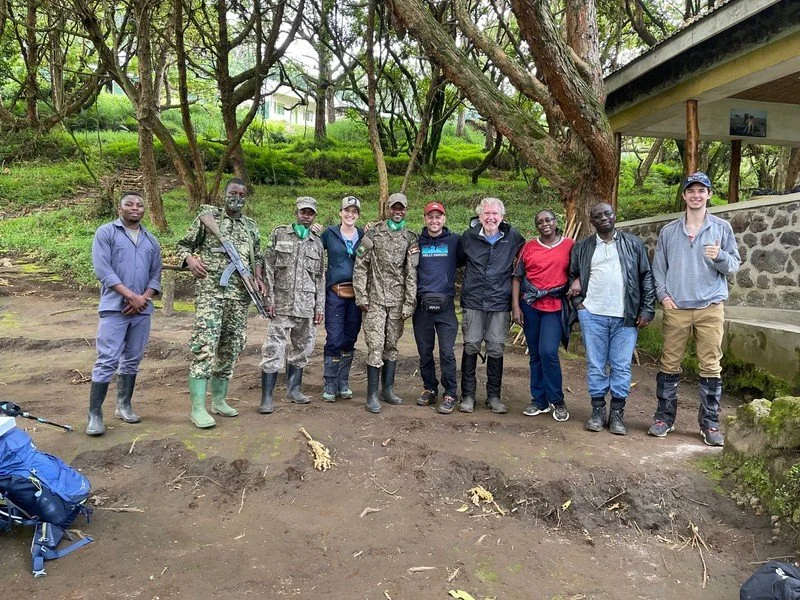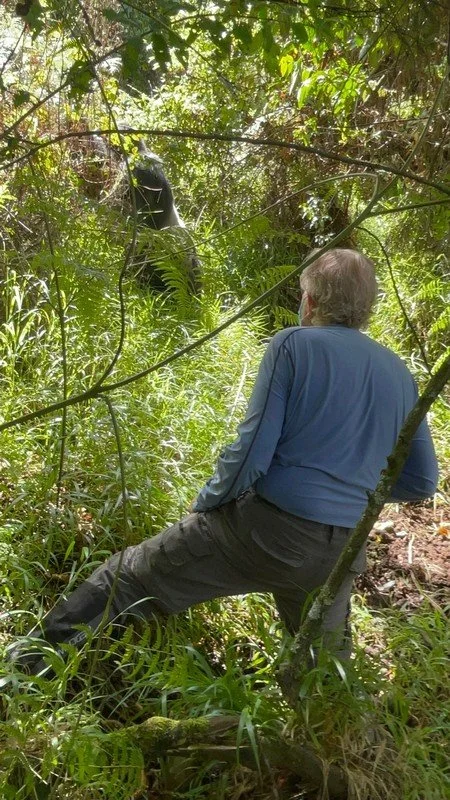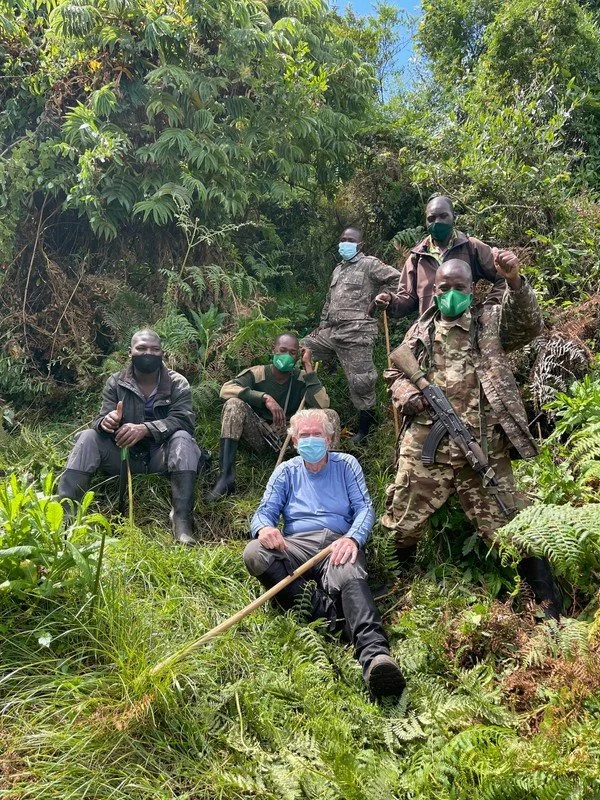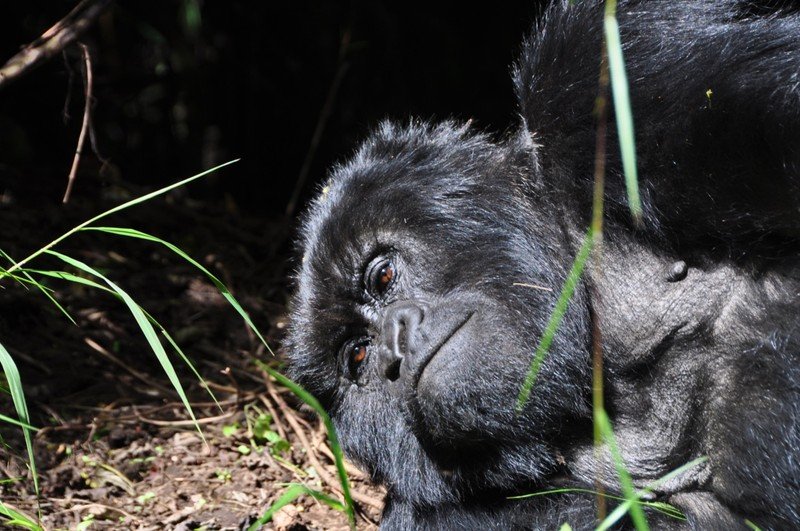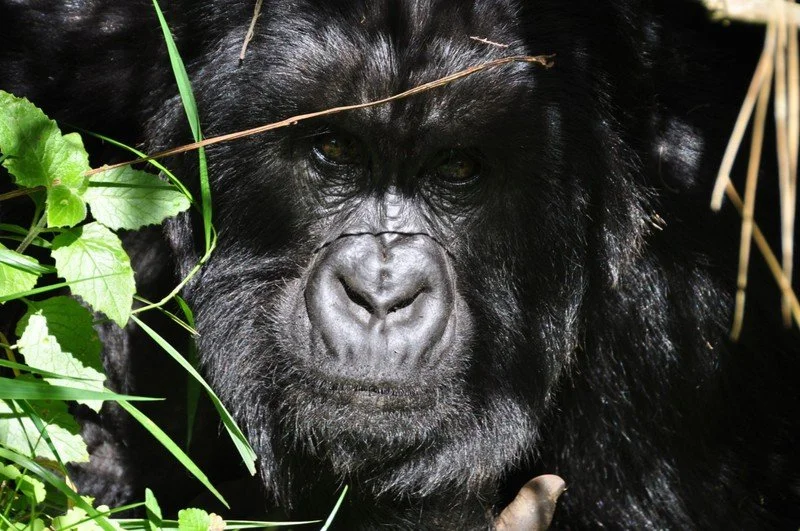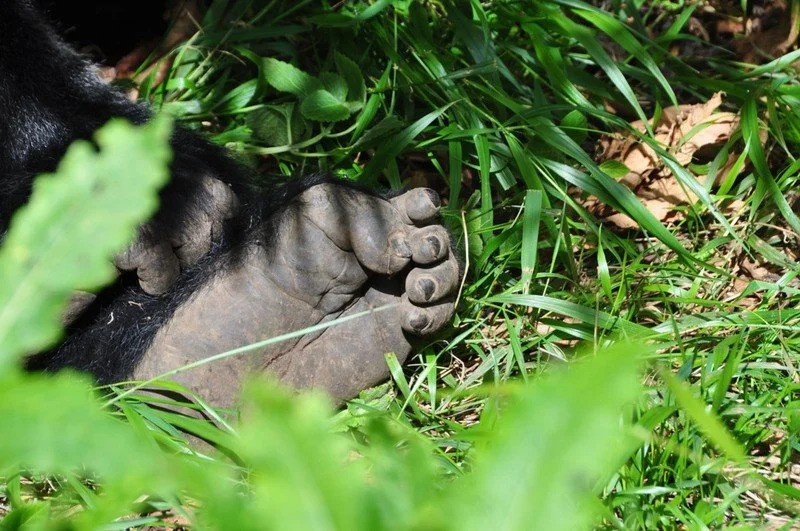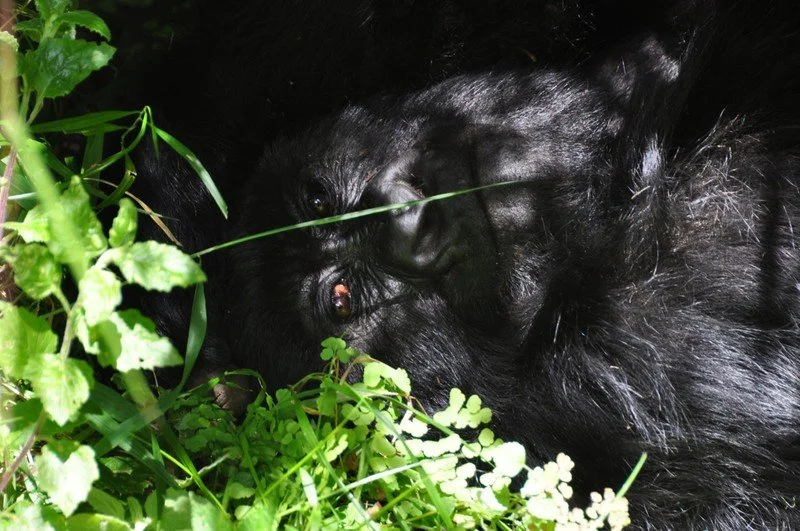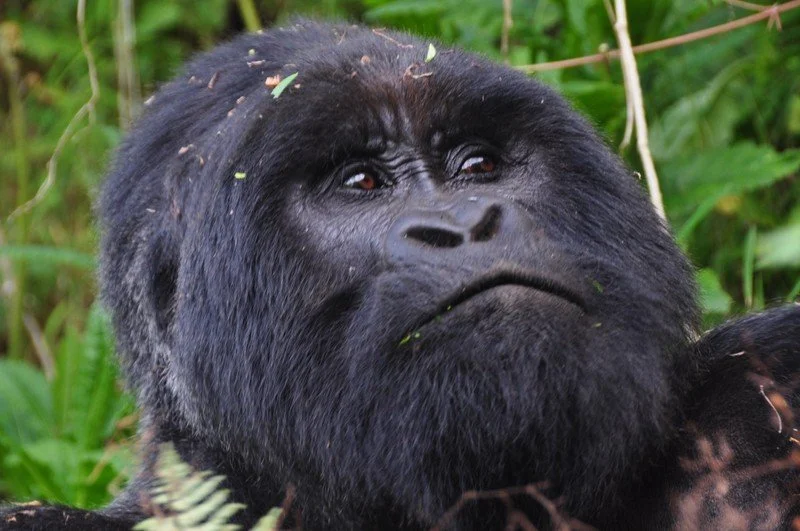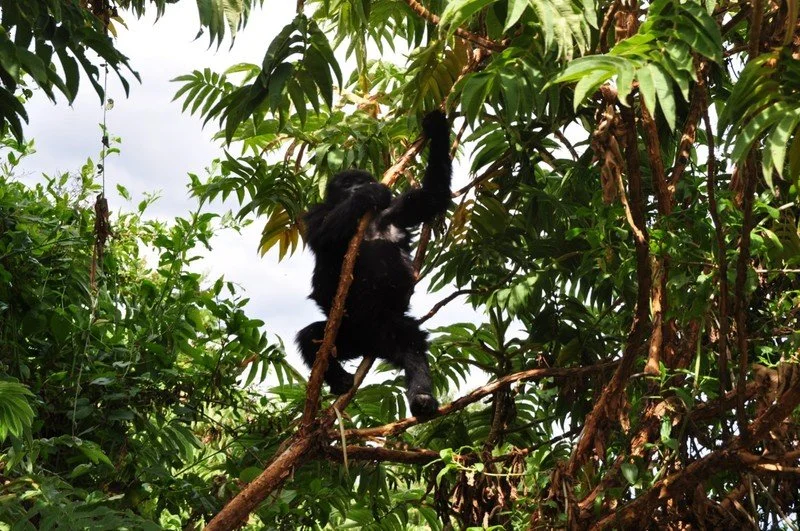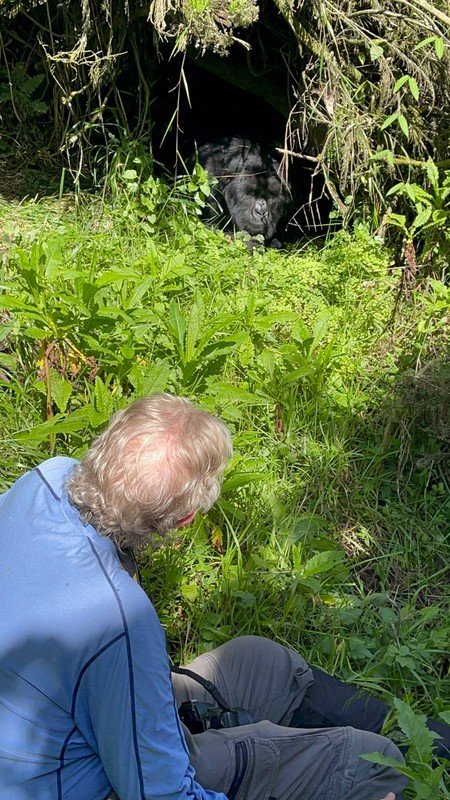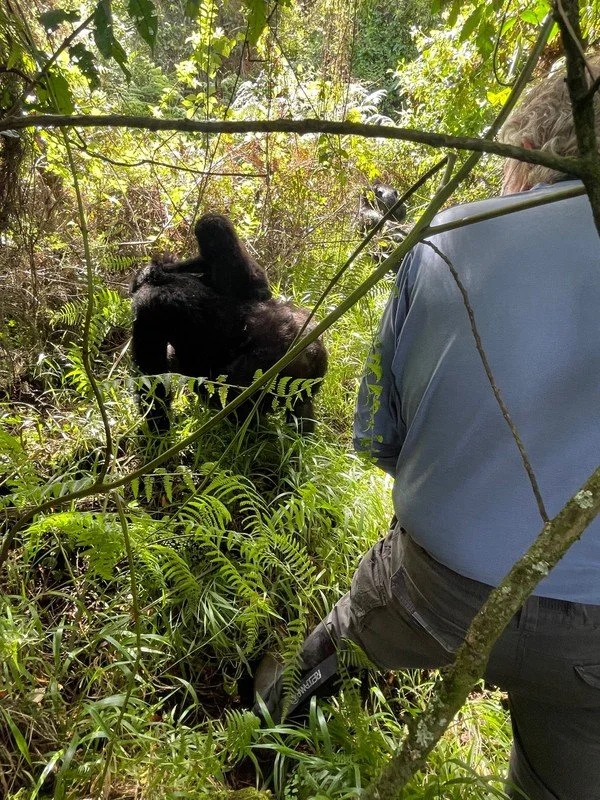Chapter Ten: The Gorillas of Mgahinga
Do You Believe in Magic?
12.06.2021 - 12.06.2021 69 °F
View Morocco + Uganda + Rwanda on paulej4's travel map.
Don sears was, I think, 92 years old when he died last month. I believe his memorial service is today on the other side of the world from me; I wish I could be there. His memory, however, is right here. A retired Presbyterian minister, Don could preach a sermon that you would, well, enjoy. He could make you laugh and he could make you feel good about yourself while at the same time reminding you that you could surely do much better. His mission in life was to do for others; he didn't care too much about himself. No dead tree in Parkville was safe from Don’s ax, wielded with his team of retirees until he was old enough to know better. He was warm, empathetic and loved to laugh. In fact, the laughter that erupted from this man belied his tiny frame. His voice was at the same time both soft and strong; I can't really explain that. I spent a lot of time in the public speaking world and his voice was unique. Even if he read every chapter of this blog, if I saw him when I came back he would make me tell him stories of the journey. There is only one reason I got to know and love Don Sears. He is the father to one of the finest men I know, Andrew Frank Sears. RIP Don; hugs to you Andy. Don would have loved to come along with me on this trip; but Andy? I'm not sure.
This is the day that I have been waiting for since I became a gorilla in college.I am drawn here in part by Sir David Attenborough of National Geographic Films' fame when he said, “There is more meaning in exchanging glances with a gorilla than any other animal I know.” That would mean a lot to me because my late great friend, Golden Retriever Norm, and I shared years of very meaningful glances.
5:45am alarm. 6:00am coffee. 6:15am breakfast--toast only. I'm afraid of a full stomach on a tough hike at this altitude not to mention that my stomach is in a bit of a knot anyway. 7:00am Abdul picks me up at the lodge. We are headed to Mgahinga National Park for my long-awaited gorilla trek with the nine-member Nyakagezi Family—led by Silverback Mark--on the slopes of the Virunga Volcanoes. I am informed that "the gorillas found here are a distinct population, cut off from the gorillas of Bwindi." Here in the Mgahinga National Park, there is but this one habituated family and it occasionally ignores customs and immigration rules and roams into Rwanda. I hoped coming here that they would be on their home territory and, luckily, they are.
There only six permits issued a day for tourists to seek this family out.
They, along with chimpanzees, orangutans and humans make up what is known as Hominidae and we are close genetic relatives. Our DNA code differs by less than 2%. (If you’re a scientist, you might point out to me that in mitochondrial DNA—which changes faster—the difference between gorillas and humans is slightly over 10%) Experts divide gorillas into two species: Western Gorillas (lowland and cross river gorillas) found in West Africa and Eastern Gorillas (mountain and eastern lowland gorillas) found here. My hosts here in the Virunga Mountains and the Bwindi Impenetrable Forest are Eastern Gorillas. They are deep black except for the silvery back sported by males. Males can weigh up to 440 pounds and stand as high as six feet; females are smaller coming in as low as 150 pounds and standing around five feet. We think they live to be up to 45 years old in the wild.
Mgahinga is inside the Virunga Mountains encompassing three inactive volcanoes: Mount Muhabura, Mount Gahinga and Mount Sabyinyo at altitudes from 7,300 feet to over 13,500 feet. Each of them can be beautifully viewed from just outside my lodge. In 1991, I am told the area was occupied by the notorious M23 Hutu Movement—responsible for a great deal of the Rwandan genocide—until as recently as 2013 when they surrendered to the Congolese Army.
Abdul delivers me to the parking area at about 8:00. I immediately employ Daniel to be my porter. Daniel will carry my backpack and camera and help me negotiate the terrain on the way up and the way down.
It takes almost 30 minutes to hike up the steep slope just to the Ranger Post. Here I meet Michael the lead Ranger and Gilbert and Felix, Ranger Guards who carry AK-47s. They lead the group and tail the group and their weapons are only to scare off buffalo or forest elephants who get too aggressive as we climb.
Michael briefs us: Tie, a Canadian recent high school grad who is spending a year traveling in Africa, a Polish couple, Marta and a guy whose name I cannot pronounce, Ugandans Pamela and her husband whose name I just forgot and me. I am asked by age and when told I was 73, Michael said he could not recall the last time someone that old was on this trek with him. Smart ass that I am, I said, “Tomorrow, you will have to say the last time you had someone this old with you was yesterday.” Everybody laughed.
Then, at 8:40, we set out. I never imagined that this hike would be this draining, difficult and challenging for me. The terrain is either grassy hiding holes which swallow your boot, rocky which promotes tripping, muddy which promotes slipping, steep which promotes falling, narrow which promotes being scratched by surrounding vegetation, low which requires stooping or flat and wonderful. The latter seldom occurs.
We are told to drink water. I had heard this from John and Suzi Adams a few weeks ago when I met them at a dinner. Abdul insisted upon it. Michael said it was critical. I had the equivalent of 3 bottles of water.
We hiked and stopped to rest and take a drink. We hiked and stopped to rest and take a drink. We continued to do this for just under two hours in thin air but cool temperatures. I am soon dubbed the silverback of the group as they alternately are concerned about my ability to keep up and marvel at how well I do. “Hey, Silverback; how are you doing.” I would smile my Paul Russell smile and either give a thumbs up, say, “Great,” or shift to just grunting as I suppose a silverback would. That got laughter and, soon, respect.
Then, all of a sudden, we stopped and were told to lay down our walking sticks, put on our masks and meet the trackers who spent all day and all night with or near this group to both protect and locate them.
No sooner had we done this than I turned around and there she was. No more than a dozen feet from where I stood was either Nshuti,22, or Cyizahye, 24, I’m not sure which. She was just sitting there eating leaves. From that moment on, it got crazy.
They were everywhere, beneath a tree napping, in a tree playing, in partial sun and partial shade munching. They were unconcerned with us. We may as well have been the group at the next table in a restaurant—of no consequence unless we got too loud.
Do you believe in magic? That is what I felt. I alternated between the Nikon and the iPhone. The iPhone really won out for me. Wearing a mask, when you put a Nikon up to your eye, your breath immediately fogs the viewfinder. The iPhone you hold away from your face so this doesn’t happen. I spent the next hour alternately taking photographs, shooting movies or just putting both tools away and delighting in the presence of these creatures.
About half an hour into our audience, Silverback Mark, the dominant male of this family made his appearance. He is the gorilla of the movies in every way. He cares not a whit about us as he grabs tree limbs and strips them of their leaves so he can eat. He grunts from time to time and relocates himself when all the leaves within reach are consumed—much as you and I might move down the salad bar taking a bit of this and a bit of that. The difference: wherever he is becomes his table.
These marvelous creatures spend most of their time on the ground—only 5% to 20% in trees to harvest fruit or play. Movement is mostly on all fours—quadrupeds—using “knuckle-walking.” Primarily vegetarians, they will also eat some insects during their mostly sedentary days. They rise with the sun from “nests” they make each night (unless it is cold and overcast) intermittently foraging and resting. The midday rest is their most social time. Silverbacks are the family leaders; infants sleep with their mothers until they are 3 or 4 years old.
Gorilla families vary in size from as few as 7 to as many as 16. There is but one dominant silverback who will lead 3-4 females and their offspring. So what happens to the other adult males? In this group, there are actually three silverbacks: Mark, 44, but also younger Ndungutse, 23, and another younger male Rukundo, 21.
There are a few all male groups, usually composed of brothers and half-brothers. Mature males leave the family group when they reach 8 to 11 years of age and take some females with them. They mate whenever they feel like it. Gestation is just under 9 months and babies nurse for at least 2 years. At the age of 3 they become more independent and mom can again mate and bear another baby.
Silverbacks protect their harems when encountering other males, sometimes violently. Michael had no explanation why this group boasts three silverbacks. They roam in “home ranges” but they do not claim discreet territories so encounters between families and among potentially competitive males are not unusual. Mountain gorillas usually roam no further than a mile on any given day. The trackers, each one anxious to help me find a great viewing or photography spot, were wonderful. The entire Ranger team was wonderful, full of smiles and anxious to help in any and every way possible. They looked out for us by stopping to make sure we drank water, were breathing well in this thin air, that we avoided ants along the trail and took note of anything worthy of comment along the way: flowers, fruits (one of which should an elephant eat five or six of them results in an aggressive and intoxicated elephant), a chameleon or two and whatever else there was.
After an hour—the limit on how much time a group can spend with the gorillas, it was time to climb down. Easier on the lungs but harder on the knees, I found myself more frequently taking Daniel’s hand to lead or steady me. I would not have made it without him. The climb down took almost two hours, the same as the climb up had taken. For some reason, my iPhone never realized that this was a walk so I have no stats from there. But the step counter on my phone says I took over 21,000 steps. And, know this, they were each and every one difficult. These are my team: The trackers in the forest, The Rangers, Daniel and me, Our entire group.
I am returned to the lodge by Abdul at around 2:30. I am as exhausted as I can ever recall being. I am spent. I am done. Phiona takes one look at me and reminds me that a complementary massage is included in my room rate. I am not a massage person. But, this time, I took her up on it.
This was a most special day. If you are fit, forget about vehicle safaris in Kenya or Tanzania or South Africa or Namibia or Botswana or Zambia or Zimbabwe all of which I have done. Forget about boat safaris in Namibia or Botswana or Brazil. Postpone polar bears in the Arctic or Penguins in the Antarctic. Take my word for it. Sitting on grass watching a gorilla who is only a dozen or so feet away from you and, who from time to time stares back, is a life-changing experience, and this is important, which must be earned. You can’t just grab a Range Rover and a driver. You’ve got to hike into the clouds and it is hard. But, my oh my, it’s worth it.
I will post some video tomorrow but, frankly, since they require editing and such, there isn't enough time to do it tonight.
I'm am so tired.

